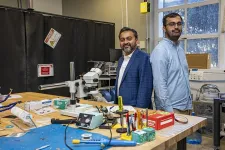(Press-News.org)
Researchers from the Research Area on Neurological Diseases, Neuroscience, and Mental Health at the Sant Pau Research Institute, led by Dr. Juan Fortea, Director of the Memory Unit of the Neurology Service at the same hospital, have found that over 95% of individuals over 65 years old who have two copies of the APOE4 gene -APOE4 homozygotes- show biological characteristics of Alzheimer's pathology in the brain or biomarkers of this disease in cerebrospinal fluid and PET scans.
The study, published today in Nature Medicine, also concludes that those individuals homozygous for APOE4 also develop the disease earlier than those with other variants of the APOE gene. These findings suggest that having two copies of the APOE4 gene could represent a new genetic form of Alzheimer's disease, as explained by Dr. Fortea.
"These data represent a reconceptualization of the disease or what it means to be homozygous for the APOE4 gene. This gene has been known for over 30 years and it was known to be associated with a higher risk of developing Alzheimer's disease. But now we know that virtually all individuals with this duplicated gene develop Alzheimer's biology. This is important because they represent between 2 and 3% of the population," explains this researcher.
New paradigm
It is known that mutations in three genes, APP, PSEN1, and PSEN2, are involved in the development of autosomal dominant early-onset Alzheimer's disease -which is clearly considered genetic and can appear from the age of 40- while variants of other genes have been associated with an increased risk of developing sporadic or late-onset forms. Additionally, it was already known that APOE was one of the genes considered the strongest genetic risk factor for late-onset Alzheimer's disease.
In this work, researchers evaluated clinical, pathological, and biomarker changes in APOE4 homozygotes to determine their risk of developing Alzheimer's disease. They used data from 3,297 brain donors, including samples from 273 APOE4 homozygotes from the National Alzheimer's Coordinating Center (United States) and clinical and biomarker data from over 10,000 individuals, including 519 APOE4 homozygotes from five large multicenter cohorts (from Europe and the United States) of subjects with Alzheimer's disease biomarkers.
The results suggest that virtually all APOE4 homozygotes showed Alzheimer's pathology and had higher levels of disease-associated biomarkers at age 55 compared to individuals with the APOE3 gene. At age 65, over 95% of APOE4 homozygotes showed abnormal levels of amyloid in cerebrospinal fluid - a key early pathological feature in Alzheimer's disease - and 75% had positive amyloid scans.
Based on these results, the authors suggest that the genetic variant of the APOE4 gene is not only a risk factor for Alzheimer's disease, as previously thought, but could also represent a distinct genetic form of Alzheimer's disease.
"This reconceptualization of the disease is similar to what we proposed from Sant Pau with Down syndrome, which a few years ago was also not considered a genetically determined form of Alzheimer's," adds Dr. Fortea.
The authors note that these findings could be useful for the development of individualized prevention strategies, clinical trials, and targeted treatment approaches for this specific population. In this regard, Dr. Alberto Lleó, a researcher in the Dementia Neurobiology Group at the Sant Pau Research Institute and Director of the Neurology Service at the same hospital, points out that "the data clearly show that having two copies of the APOE4 gene not only increases the risk, but also anticipates the onset of Alzheimer's, reinforcing the need for specific preventive strategies."
On his behalf, researcher Dr. Víctor Montal, who actively participated in this study during his time at Sant Pau and now studies the molecular structure of the APOE gene at the Barcelona Supercomputing Center, adds that "the findings emphasize the importance of monitoring APOE4 homozygotes from an early age for preventive interventions."
END
NEW YORK, May 6, 2024 – New research, published online today in the American Journal of Psychiatry, examined a broad range of potential predictors of substance use among adolescents and found sociodemographic variables were the most robust predictors of substance use initiation.
The study is part of a special issue of the journal highlighting advances in understanding the neurobiology and sociodemographic underpinnings of substance use disorders and how this understanding has advanced recognition and treatment. Several authors discussed this work today at a special briefing during the 2024 Annual Meeting of the American Psychiatric ...
About The Study: In this cohort study of Medicare patients with atrial fibrillation, Black and Hispanic patients were less likely to initiate direct oral anticoagulants for atrial fibrillation, although these differences diminished over time. Identifying the factors behind these early disparities is crucial for ensuring equitable access to novel therapies as they emerge for Black and Hispanic populations.
Corresponding Authors: To contact the corresponding authors, email Kamika R. Reynolds, M.S., Ph.D. (kreynolds@ifh.rutgers.edu) and Chintan ...
About The Study: These findings show that text messaging women after initial breast cancer screening outreach via either electronic portal or mailings, as well as bulk ordering with or without text messaging, can increase mammogram completion rates.
Corresponding Author: To contact the corresponding author Shivan J. Mehta, M.D., M.B.A., M.S.H.P., email shivan.mehta@pennmedicine.upenn.edu.
To access the embargoed study: Visit our For The Media website at this link https://media.jamanetwork.com/
(doi:10.1001/jamainternmed.2024.0507)
Editor’s Note: Please see the article for additional information, including other authors, author contributions ...
Planetary scientists at the University of Colorado Boulder have discovered how Venus, Earth’s scalding and uninhabitable neighbor, became so dry.
The new study fills in a big gap in what the researchers call “the water story on Venus.” Using computer simulations, the team found that hydrogen atoms in the planet’s atmosphere go whizzing into space through a process known as “dissociative recombination”—causing Venus to lose roughly twice as much water every day compared to previous estimates.
The team will publish their findings May 6 in ...
In the 1940s and 1950s, the ocean off the coast of Los Angeles was a dumping ground for the nation’s largest manufacturer of the pesticide DDT – a chemical now known to harm humans and wildlife. Due to the stubborn chemistry of DDT and its toxic breakdown products, this pollution continues to plague L.A.’s coastal waters more than half a century later. While legal at the time, details of this industrial-scale pollution of the marine environment at a dump site some 15 miles offshore near Catalina Island ...
Turbid waters keep the coast healthy
To preserve the important intertidal areas and salt marshes off our coasts for the future, we need more turbid water. That is one of the striking conclusions from a new study conducted by a Dutch-Chinese team of researchers and published today in Nature Geoscience."These natural areas outside our dikes are essential for nature and coastal defense. But because how we are now building in the Delta and the hinterland, coastal defense is endangered in the long term," warns NIOZ researcher Tim Grandjean.
Satellite measurements
For his research, Grandjean linked decades of satellite measurements ...
A new imaging technique tested in patients could improve the evaluation of cardiac conditions and undiagnosed chest pain.
Researchers from Imperial College London’s Department of Bioengineering and Faculty of Medicine worked alongside academics from UCL to produce sub-millimetre resolution images of cardiac micro-vessels. The non-invasive new imaging technique was tested on four human patients.
Existing imaging technologies can visualise large vessels on the heart’s surface. However, this new technique could allow scientists to study the physiology of the heart in more detail by imaging smaller micro-vessels within the heart muscle.
This research, ...
BOSTON–Eleven million U.S. adults use e-cigarettes to vape nicotine, and about half of them say that they want to stop, but many have trouble doing so because nicotine is an addictive drug.
A plant-based medication called cytisinicline may be an effective therapy to help them stop vaping, according to the results of a new clinical trial co-led by an investigator from Massachusetts General Hospital, a founding member of the Mass General Brigham healthcare system. The trial’s findings are published in JAMA Internal Medicine.
In the double-blind randomized clinical trial, 160 adults who vaped nicotine ...
– By Alison Hatt
In the ongoing quest to make electronic devices ever smaller and more energy efficient, researchers want to bring energy storage directly onto microchips, reducing the losses incurred when power is transported between various device components. To be effective, on-chip energy storage must be able to store a large amount of energy in a very small space and deliver it quickly when needed – requirements that can’t be met with existing technologies.
Addressing this challenge, scientists ...
Norman, OK – Talayeh Razzaghi, an assistant professor of industrial and systems engineering at the University of Oklahoma, has been awarded a Faculty Early Career Development Program award from the National Science Foundation for her work titled “Personalized Maternal Care Decision Support System for Underserved Populations.”
Known as a CAREER award, Razzaghi was awarded $496,732 to research machine learning-based clinical decision support tools for early preeclampsia detection in maternal ...






